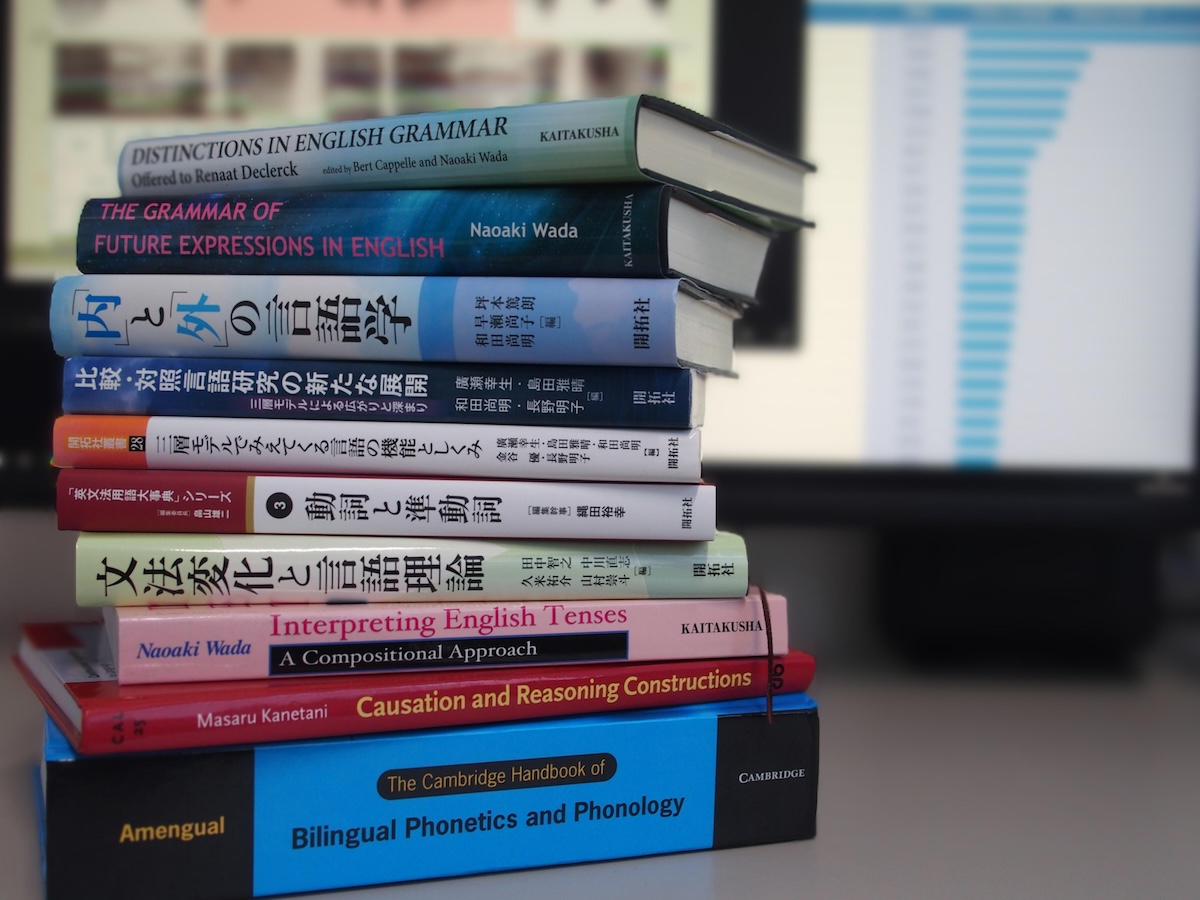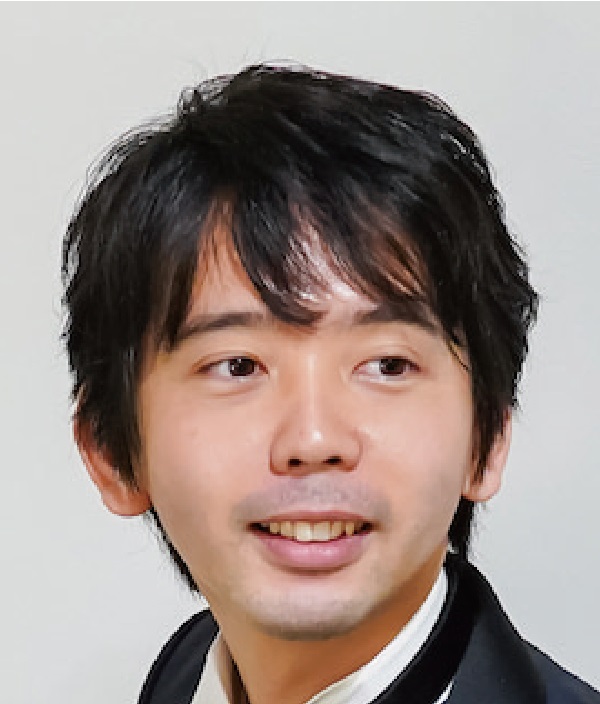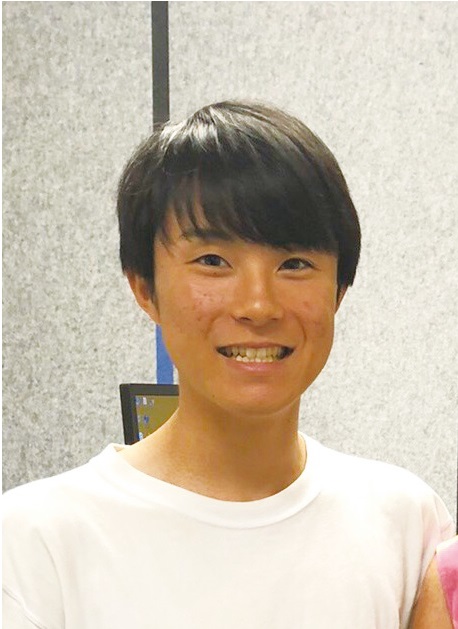英語学コースとは?
英語の仕組みを知り、人間言語を探る
言語研究は多岐にわたっており、特定の言語について深く知るための研究もあれば、様々な言語に共通する性質を探る研究もあります。
みなさんが英語学コースで触れることになる英語学という学問分野は、そのどちらも行います。英語について、歴史、音声・音韻、形態、文の形式や意味、文脈内での使用法、習得過程などを研究することで、英語という言語の背後にある様々な仕組みがわかってきます。それと同時に、英語以外の言語の様々な現象に関しても、同じ分析手法を適用して共通の概念でとらえることができることに気づいていきます。
これは、英語のしくみを知り、人間言語を探っていることにほかなりません。英語で書かれた基礎文献を読み、英語学の基礎知識や研究方法を学びながら英語で卒業論文を書いていく過程で、このようなことを体験していきます。英語学コースが開設する科目を中核としながらも、他コースや他学類の科目も履修してみてください。
英米語圏の文学、文化、歴史、地理、思想などの勉強を通して、英語力を磨き、英語に対する幅広い知識を得ることは、英語学の研究を進めるうえで大きな力になります。また、心理学、数学、生物学、情報科学なども言語学、英語学に関連するところがありますので、ぜひ関心を持ってみてください。
教授[理論言語学]島田 雅晴
授業科目の一例
- 英語学概論
- 英語文法論・統語論
- 英語意味論・語用論
- 英語音韻論・形態論
- 英語論文講読
- 英語学演習
- 英語学論文演習

授業紹介
英語学概論はどんな授業?
英語学というのは、英語を対象とする言語学のことです。言語学とは、人間の用いることばの仕組みを明らかにする学問のことです。
ことばには、音声があり、音声は意味を伝えます。そして、音声と意味を結びつけるのが文法です。音声にも意味にも文法にも一定の規則性があります。だからこそ、人間はことばで意思疎通ができるのです。英語をもとに、ことばの規則性について考え、英語自体への理解も深めることを目的とする授業です。
先輩たちの卒業論文
- A Semantic Study of the Preposition over
- A Syntactic Approach to Psychological Predicates in English
- A Lexical Network Approach to the Verb Take in English
- A Semantic Study of Presupposition of the I don’t know that X Construction
- A Syntactic Study of Residual Verb + Not Construction in Late Modern English
- A Study of Preposition Stranding in English
- An Antilocality Approach to Freezing Effects in English
- A Comparative Study of Long-Distance Anaphors in English and Japanese
- A Study of Argument Realization in English: Exploring Passive Construction
- A Cognitive Analysis of Inanimate Subject Constructions in Japanese and English
所属教員紹介
| 教員名 | 職階 | メッセージ | |
|---|---|---|---|

|
和田 尚明 Naoaki Wada | 教授 | 英語学コース 時制・アスペクト・モダリティ |

|
島田 雅晴 Masaharu Shimada | 教授 | 英語学コース 理論言語学 |

|
宮腰 幸一 Koichi Miyakoshi | 准教授 | 英語学コース 理論言語学 |

|
金谷 優 Masaru Kanetani | 准教授 | 英語学コース 英語学、構文文法、語用論 |

|
山村 崇斗 Shuto Yamamura | 助教 | 英語学コース 生成統語論、文法変化 |

|
矢澤 翔 Kakeru Yazawa | 助教 | 英語学コース 音声学・音韻論・第二言語習得 |
学生の声

卒業生高橋 舞
皆さんは「英語学」という学問を知っていますか?スピーキングやリーディングの練習など、高校の英語の授業の延長かなと思った人も多いのではないでしょうか。実際私もそうでした。
しかし、「英語学」は、高校で習った発音や文法がなぜそのようにあるのかという、英語そのものの背景を解明していく学問なのです。その観点は様々で、音声や形態、認知、歴史など、多角的な方法で英語を分析・考察していきます。
例えば、私は「英語では主語“I”を必ず置かなければならないが、対応する日本語では“私”が出現しないことが多いのはなぜか」という問いを、認知の仕方の違いから研究しています。研究を深めると、英語の背景にある整然たる規則性や合理性に驚かされることばかりです。また、英語学コースは、普段の論文読解はもちろん、卒論も英語で執筆するため、英語の運用能力も鍛えられます。
皆さんも英語に対してなぜ?どうして?と少しでも疑問を感じたことはありませんか。筑波大学の英語学コースには、多様な分野に精通した熱い教授がたくさんいらっしゃいます。ふと抱いた英語に関する些細な問いを、きっと無限大に広げてくれるでしょう。
ただ英語を習得するだけでなく、その背景を解明していく「英語学」は、あなたの知的探求心を満たしてくれること間違いなしです。
英語が好き、もっと知りたい、そんなあなたはぜひ英語学コースへ!
About the English Linguistics Course
Understanding the mechanisms of English and considering human language
Linguistics is a discipline that approaches the human mind through the lens of language. In the English Linguistics Course, students learn the various mechanisms behind English from the linguistics perspective. This covers a wide range of topics, including sounds, the form and meaning of words and sentences, discourse as a sequence of sentences, interactions with situations, the history of English, comparisons with Japanese and other languages, and so on. Considering these aspects linguistically is what matters, which means that English as a particular language is studied in connection with human language in general.
For this purpose, students take classes in which they learn the basic knowledge and methods of English linguistics while aiming to cultivate their English ability. The culmination of all this is the graduation thesis, where students choose a topic, uncover some issues, consider them in their own way, and then write about them clearly and logically in English. This provides students with a very creative experience. Through all these learning processes, students will foster fundamental abilities useful in any field of society, such as the ability to generalize from particulars, to uncover issues, to think autonomously, to communicate in English, to express themselves clearly, and to be creative.
Professor [Contrastive Studies of Japanese and English from the Perspective of Cognitive Semantics]Yukio Hirose,
Example of Subjects
- Introduction to English Linguistics
- English Grammar and Syntax
- English Semantics and Pragmatics
- English Phonology and Morphology
- Readings in English Linguistics
- Seminar in English Linguistics
- Thesis-Writing in English Linguistics (Seminar)
Course Introduction
Introduction to English Linguistics
English Linguistics investigates English from the perspective of linguistics. Languages have sounds which convey meanings. It is grammar that associates sounds with meanings. There are certain rules in sounds, meanings, and grammar. These rules are precisely what allows us to communicate in language. In this class, we will consider the regularity of language on the basis of English, while deepening our understanding of English itself.
Past Thesis Titles
- A Study of Grammaticalization of NP of NP in English
- A Study of Causative Alternations in English
- A Diachronic Study of Reflexive Constructions in English
- A Lexical Network Approach to the Verb Take in English
- A Semantic Study of Degree Achievement Verbs with the Derivational Suffix -en in English
- A Study of Middle Constructions in English
- A Semantic Study of Content Clauses in English
Faculty Members
| 教員名 | 職階 | メッセージ | |
|---|---|---|---|

|
和田 尚明 Naoaki Wada | 教授 | 英語学コース 時制・アスペクト・モダリティ |

|
島田 雅晴 Masaharu Shimada | 教授 | 英語学コース 理論言語学 |

|
宮腰 幸一 Koichi Miyakoshi | 准教授 | 英語学コース 理論言語学 |

|
金谷 優 Masaru Kanetani | 准教授 | 英語学コース 英語学、構文文法、語用論 |

|
山村 崇斗 Shuto Yamamura | 助教 | 英語学コース 生成統語論、文法変化 |

|
矢澤 翔 Kakeru Yazawa | 助教 | 英語学コース 音声学・音韻論・第二言語習得 |
Student Voice

former studentYuki Okada
In the College of Humanities, students split into different majors when they become third year students. When I was a first year student, I was torn between German Linguistics (currently General Linguistics) and English Linguistics courses. For this reason, I took classes that could be applied to either course, one of which offered by the English Linguistics course dealt with Old English. Studying Old English, I found it fascinating how similar the language is to modern German. I found that some phenomena occur in both languages while others occur in either one, which stirred my interest in language itself.
Though I’d just studied English for the entrance exam, this class made me interested in revealing the essence of the English language and learning more about how the language itself works, and so I chose the English Linguistics course. Linguistics, unlike language studies, is a discipline that studies how people think about and perceive things by observing language.
In the English Linguistics course, students explore the mind of native speakers of English through the English language. Thus, just because you have studied English linguistics doesn’t mean you become a fluent speaker of English. However, you will achieve something more significant than just being able to speak English; you will approach the spirit of a native speaker. Also, reviewing and reporting on the research literature will help you to acquire not only logical thinking skills but also the ability to explain in a way that others understand readily. This is a skill that I believe is absolutely necessary in the society.
In the English Linguistics course, you can research linguistic phenomena that interest you from various perspectives such as semantics, sentence structures, and history of English. Enthusiastic support of the kind faculty, who are active in the front lines, allows you to pursue what interests you.
